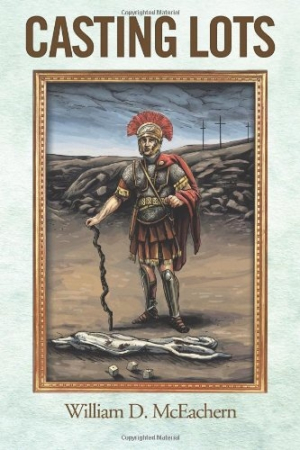Casting Lots
Two lost men find their way together after being touched by Christ in very different ways.
Had the Gospel writer Luke kept a diary, it might have read like Casting Lots, a debut novel by William D. McEachern. The book is a richly detailed first-century land and sea journey.
McEachern begins with a foreword that purports to tell how he translated the scrolls of Lucinius, or Luke, into modern, conversational English. The forward, the scrolls, and the entire novel are, in fact, fiction, though historically and biblically based. That Casting Lots is not an authentic journal could have been explained more plainly. However, approached purely as a novel, it’s still interesting to envision Lucinius’s story and that of his traveling partner, an aged Roman centurion name Cornelius.
Lucinius is a young, highly educated Greek who was sold into slavery by pirates. He once aspired to be a physician and to marry the love of his life, but concedes that both of those are now unlikely pipe dreams. McEachern paints Lucinius as elite, having “more than a working knowledge of Latin as well as Aramaic, and he seems to have learned at least some written Hebrew. At times his writing can be lyrical, including poetry so transcendent that some claim it rivals Shakespeare’s.”
With the consent of the young Greek’s slave master, Cornelius takes Lucinius on a lengthy journey.
The two men go by boat and by foot, through cities and wilderness, from Caesarea Maritima in Judea, across the Mediterranean Sea, to Rome, and ultimately to Greece. Along the way, Cornelius tells the story of how he led the Roman soldier detail that crucified Christ. The experience soured the rest of his life. Cornelius shares other stories as well, often in great detail, about current and past Roman leaders and events. Lucinius initially finds Cornelius’s ramblings tedious and doesn’t grasp their collective importance in illustrating a miracle until the journey is almost complete.
Casting Lots is an archetypal novel of personal growth over the course of a long trip; by the time they arrive at their destination, both men have attained new personal and philosophical heights. They have in common, they ultimately understand, lives wrenched by pain and a desire to find peace.
For readers interested in the history and geography of the Roman Empire, the story proceeds, literally, like a road map. It takes an easy-to-follow, circular trek through a succession of ancient cities while discussing in intricate detail the course of Roman politics and happenings in the centuries leading up to the birth and death of Christ, often correlated with where on the road Lucinius and Cornelius are.
Casting Lots is, in the end, an inspirational tale about those whose lives were so transformed by even brief interactions with Christ that they committed the rest of their days to the work of spreading the Gospel. It will grab readers as the story of two lost men finding their way, together.
Reviewed by
Karyn Saemann
Disclosure: This article is not an endorsement, but a review. The publisher of this book provided free copies of the book and paid a small fee to have their book reviewed by a professional reviewer. Foreword Reviews and Clarion Reviews make no guarantee that the publisher will receive a positive review. Foreword Magazine, Inc. is disclosing this in accordance with the Federal Trade Commission’s 16 CFR, Part 255.

